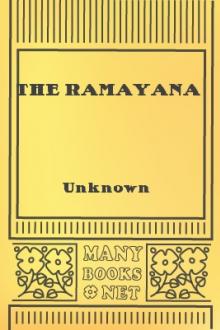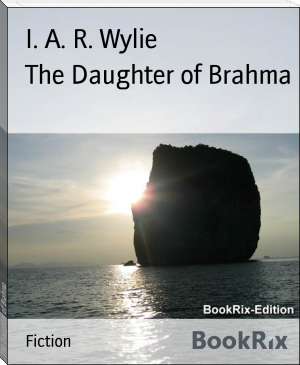The Ramayana - Valmiki (best ereader for epub txt) 📗

- Author: Valmiki
- Performer: -
Book online «The Ramayana - Valmiki (best ereader for epub txt) 📗». Author Valmiki
tei-l" style="text-align: left">The King of Gods and Yáma feared,
While panic struck their heavenly train,
Lies prostrate in the battle slain.
Thy haughty heart thou wouldst not bend,
Nor listen to each wiser friend.
Ah, had the dame, as they implored,
Been yielded to her injured lord,
We had not mourned this day thy fall,
And happy had it been for all.
Then Ráma and thy friends content
In blissful peace their days had spent.
Thine injured brother had not fled,
Nor giant chiefs and Vánars bled.
Yet for these woes we will not blame.
Thy fancy for the Maithil dame,
Fate, ruthless Fate, whom none may bend
Has urged thee to thy hapless end.”
Canto CXIII. Mandodarí's Lament.
While thus they wept, supreme in place,
The loveliest for form and face,
Mandodarí drew near alone,
Looked on her lord and made her moan:
“Ah Monarch, Indra feared to stand
In fight before thy conquering hand.
From thy dread spear the Immortals ran;
And art thou murdered by a man?
Ah, 'twas no child of earth, I know,
That smote thee with that mortal blow.
'Twas Death himself in Ráma's shape,
That slew thee: Death whom none escape.
Or was it he who rules the skies
Who met thee, clothed in man's disguise?
Ah no, my lord, not Indra: he
In battle ne'er could look on thee.
One only God thy match I deem:
'Twas Vishṇu's self, the Lord Supreme,
Whose days through ceaseless time extend
And ne'er began and ne'er shall end:
He with the discus, shell, and mace,
Brought ruin on the giant race.
Girt by the Gods of heaven arrayed
Like Vánar hosts his strength to aid,
He Ráma's shape and arms assumed
[pg 493]
And slew the king whom Fate had doomed.
In Janasthán when Khara died
With giant legions by his side,
No mortal was the unconquered foe
In Ráma's form who struck the blow.
When Hanumán the Vanár came
And burnt thy town with hostile flame,
I counselled peace in anxious fear:
I counselled, but thou wouldst not hear.
Thy fancy for the foreign dame
Has brought thee death and endless shame.
Why should thy foolish fancy roam?
Hadst thou not wives as fair at home?
In beauty, form and grace could she,
Dear lord, surpass or rival me?
Now will the days of Sítá glide
In tranquil joy by Ráma's side:
And I—ah me, around me raves
A sea of woe with whelming waves.
With thee in days of old I trod
Each spot beloved by nymph and God;
I stood with thee in proud delight
On Mandar's side and Meru's height;
With thee, my lord, enchanted strayed
In Chaitraratha's1013 lovely shade,
And viewed each fairest scene afar
Transported in thy radiant car.
But source of every joy wast thou,
And all my bliss is ended now.”
Then Ráma to Vibhishaṇ cried:
“Whate'er the ritual bids, provide.
Obsequial honours duly pay,
And these sad mourners' grief allay.”
Vibhishaṇ answered, wise and true,
For duty's changeless law he knew:
“Nay one who scorned all sacred vows
And dared to touch another's spouse,
Fell tyrant of the human race,
With funeral rites I may not grace.”
Him Raghu's royal son, the best
Of those who love the law, addressed:
“False was the rover of the night,
He loved the wrong and scorned the right.
Yet for the fallen warrior plead
The dauntless heart, the valorous deed.
Let him who ne'er had brooked defeat,
The chief whom Indra feared to meet,
The ever-conquering lord, obtain
The honours that should grace the slain.”
Vibhishaṇ bade his friends prepare
The funeral rites with thoughtful care.
Himself the royal palace sought
Whence sacred fire was quickly brought,
With sandal wood and precious scents
And pearl and coral ornaments.
Wise Bráhmans, while the tears that flowed
Down their wan cheeks their sorrow sowed,
Upon a golden litter laid
The corpse in finest ropes arrayed.
Thereon were flowers and pennons hung,
And loud the monarch's praise was sung.
Then was the golden litter raised,
While holy fire in order blazed.
And first in place Vibhishaṇ led
The slow procession of the dead,
Behind, their cheeks with tears bedewed,
Came sad the widowed multitude.
Where, raised as Bráhmans ordered, stood
Piled sandal logs, and scented wood,
The body of the king was set
High on a deerskin coverlet.
Then duly to the monarch's shade
The offerings for the dead they paid,
And southward on the eastern side
An altar formed and fire supplied.
Then on the shoulder of the dead
The oil and clotted milk were shed.
All rites were done as rules ordain:
The sacrificial goat was slain.
Next on the corpse were perfumes thrown
And many a flowery wreath was strown;
And with Vibhishaṇ's ready aid
Rich vesture o'er the king was laid.
Then while the tears their cheeks bedewed
Parched grain upon the dead they strewed;
Last, to the wood, as rules require,
Vibhishaṇ set the kindling fire.
Then having bathed, as texts ordain,
To Lanká went the mourning train.
Vibhishaṇ, when his task was done,
Stood by the side of Raghu's son.
And Ráma, freed from every foe,
Unstrung at last his deadly bow,
And laid the glittering shafts aside,
And mail by Indra's love supplied.
Canto CXIV. Vibhishan Consecrated.
Joy reigned in heaven where every eye
Had seen the Lord of Lanká die.
In cars whose sheen surpassed the sun's
Triumphant rode the radiant ones:
And Rávaṇ's death, by every tongue,
And Ráma's glorious deeds were sung.
They praised the Vánars true and brave,
The counsel wise Sugríva gave.
The deeds of Hanúmán they told,
The valiant chief supremely bold,
The strong ally, the faithful friend,
And Sítá's truth which naught could bend.
To Mátali, whom Indra sent,
His head the son of Raghu bent:
And he with fiery steeds who clove
The clouds again to Swarga drove.
[pg 494]
Round King Sugríva brave and true
His arms in rapture Ráma threw,
Looked on the host with joy and pride,
And thus to noble Lakshmaṇ cried:
“Now let king-making drops be shed,
Dear brother, on Vibhishaṇ's head
For truth and friendship nobly shown,
And make him lord of Rávaṇ's throne.”
This longing of his heart he told:
And Lakshmaṇ took an urn of gold
And bade the wind-fleet Vánars bring
Sea water for the giants' king.
The brimming urn was swiftly brought:
Then on a throne superbly wrought
Vibhishaṇ sat, the giants' lord,
And o'er his brows the drops were poured.
As Raghu's son the rite beheld
His loving heart with rapture swelled:
But tenderer thoughts within him woke,
And thus to Hanúmán he spoke:
“Go to my queen: this message give:
Say Lakshmaṇ and Sugríva live.
The death of Lanká's monarch tell,
And bid her joy, for all is well.”
Canto CXV. Sítá's Joy.
The Vánar chieftain bowed his head,
Within the walls of Lanká sped,
Leave from the new-made king obtained,
And Sítá's lovely garden gained.
Beneath a tree the queen he found,
Where Rákshas warders watched around.
Her pallid cheek, her tangled hair,
Her raiment showed her deep despair,
Near and more near the envoy came
And gently hailed the weeping dame.
She started up in sweet surprise,
And sudden joy illumed her eyes.
For well the Vánar's voice she knew,
Free e-book «The Ramayana - Valmiki (best ereader for epub txt) 📗» - read online now
Similar e-books:





Comments (0)